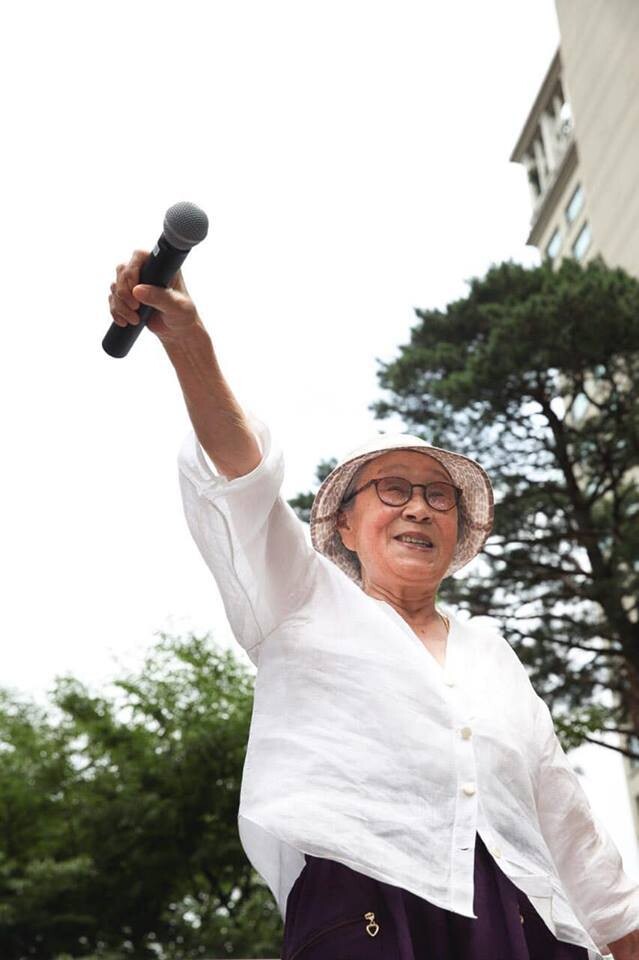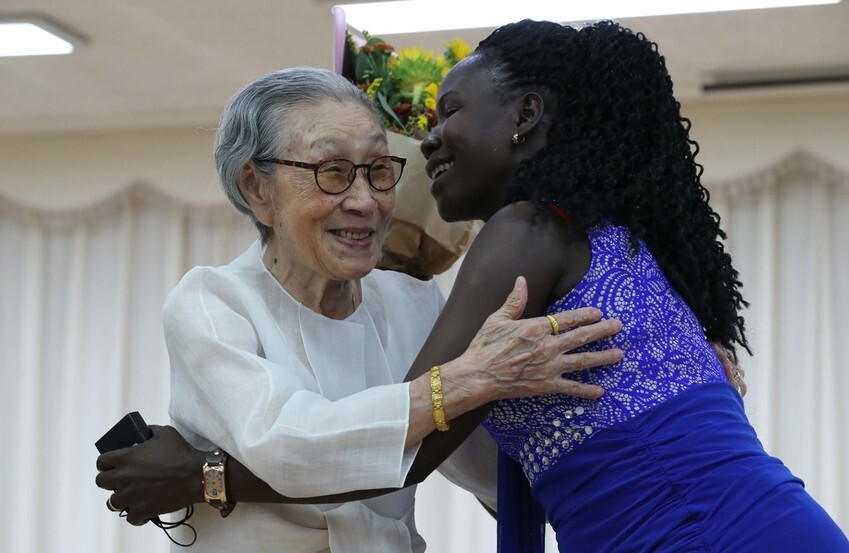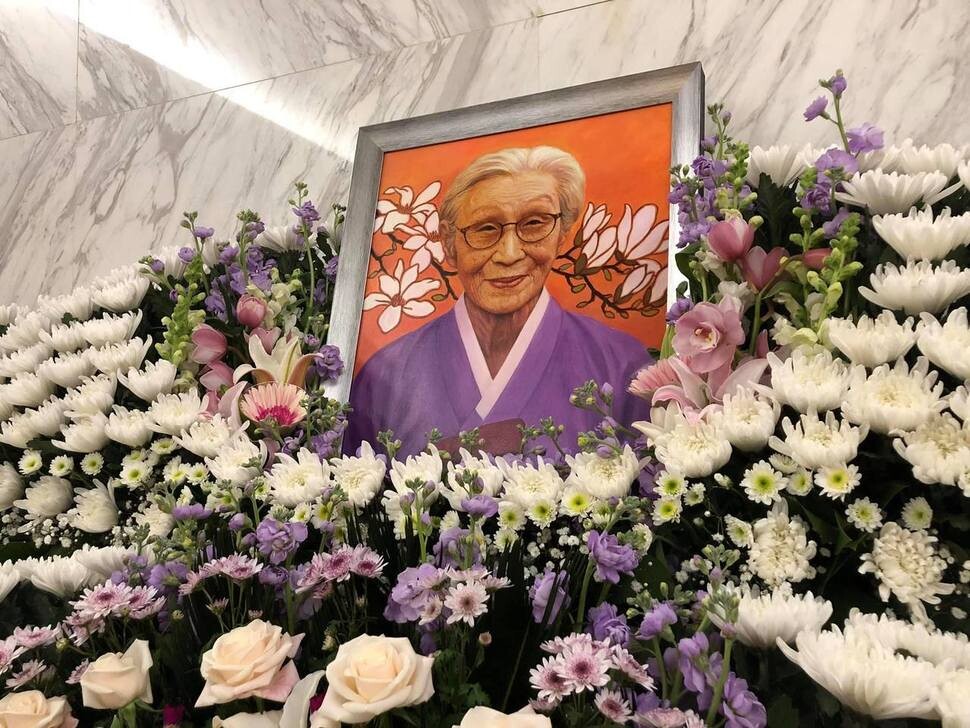hankyoreh
Links to other country sites 다른 나라 사이트 링크
[Obituary] A lifetime of struggling for peace and justice

Kim Bok-dong was born in 1926 in Yangsan, South Gyeongsang Province. After completing the fourth grade of elementary school, she helped out with household chores until the age of 15. Her mother had told her stay close to home because “the times were strange.”
One day in 1941 – she can’t remember if it was the spring or the fall – Japanese people in yellow uniforms without rank badges came to her house, accompanied by her village leader and another official. Kim was told she needed to work for three years at a factory making army uniforms – and if she didn’t go, her family would be kicked out of their house and their property seized.
Figuring that it wouldn’t kill her to work at a factory, Kim told her mother she would go. At the age of 15, she was taken to Taiwan and then on to a Japanese military unit based in China’s Guangdong Province. How different her life would have been if she hadn’t gone with the Japanese back in 1941!
At 10:41 pm on Jan. 28, Kim Bok-dong – former comfort woman (sex slave) for the Japanese imperial army and later a peace activist – closed her eyes for the last time, without ever receiving an apology from the Japanese government. She was 93 years old.
For my whole life, I’ve never been able to love anyone,” Kim said in an interview in the Feb. 22, 2014, issue of the Hankyoreh.
That 15-year-old girl had to receive Japanese soldiers from noon until 5 pm on Saturday and from 8 am until 5 pm on Sunday. On weekdays, she was visited by soldiers who couldn’t make it on the weekend. For eight years, she lived as a sex slave for the Japanese army, carted around in a truck to places she’d never heard of, including Hong Kong, Malaysia, Sumatra, Indonesia, Java, Bangkok and Singapore.
Until Kim in 1992, then 66 years old, informed the South Korean government that she had been a comfort woman, none of her family or friends had been aware of her past. After Kim barely managed to return to Korea following its liberation from Japan’s colonial occupation, the only person she confided to about the unimaginable things she’d suffered was her mother. The grief this brought her mother haunted her until she died of heart disease.

Shunned by her local community for speaking the truth
From Korea’s liberation until that day in 1992, Kim lived alone in Busan where she had a business, never taking a husband or giving birth to a child. She felt a little better when she “spent money on people who were down on their luck.” But after Kim testified about her experience as a comfort woman and her face started to be recognized, she was estranged from people in her neighborhood.
“I don’t know what happened to the things I said every day, again and again, [. . .] the things I said until my mouth ached on the television and in newspaper interviews. There would be a few words and then ‘Kim Bok-dong, comfort woman’ or ‘elderly comfort woman Kim Bok-dong.’ [. . .] That kind of thing just makes it sound like I’m advertising the fact that I was a comfort woman, don’t you think?” Kim said in her 2014 interview with the Hankyoreh.
Kim’s apparent grievance actually symbolizes the courage of the victims of the system of sexual slavery who didn’t survive or who’d been forced to keep their story to themselves.
After Kim began testifying about her experience as a comfort woman at the age of 66, she soon became a peace activist. Kim traveled all around the world – to the UN, the US, Japan and France – to raise awareness about the comfort women issue. She spoke out in favor of a “world without war.” Kim was driven by the fervent desire for no one else to become a victim of sexual violence in wartime, as she had been. The international community was moved by Kim’s appeal to address the issue of sexual violence taking place in areas of armed conflict around the world, such as the Congo and Uganda.
“I’m a former comfort woman and I continue to stand in front of the Japanese embassy every Wednesday to fight for the restoration of our honor and human rights, but I’m also only too aware of what women around the world who are victims of wartime sexual violence just like us are suffering even now. That makes me want to help those women,” Kim said at a press conference for the establishment of the Butterfly Fund on International Women’s Day, Mar. 8, 2012.
Donating her life savings to educating posterity
In 2015, at the age of 89, Kim donated 50 million won (US$44,762), which represented her life savings, to the Butterfly Fund for use in supporting young victims in conflict zones and for training peace activists. The Butterfly Fund used this money to create the Kim Bok-dong scholarship fund.
That same year, Kim’s name appeared on a list of “heroes who fight for freedom” selected by international press organizations, alongside Nelson Mandela, the first black president of South Africa, and Martin Luther King Jr., a leader of the US civil rights movement.
“We need to be united. It’s only by being united that we can defeat Japan. During World War II, they tried to make all the young people take on Japanese names and become completely Japanese. [. . .] Considering how much Koreans sacrificed when they were drafted by the Japanese, I can’t tell you how awful it was to hear that Koreans are still suffering in that country today. [. . .] If Koreans don’t help out with the Chosen Gakko Korean schools in Japan, who will? I want to help Koreans get a fine education, no matter how many there are,” Kim said in her final interview, published in the Jan. 17, 2019, issue of the Chosun Sinbo, the daily newspaper of the General Association of Korean Residents in Japan (Chongryon)
Kim Bok-dong took a keen interest in ethnic Koreans living in Japan, known as Zainichi Koreans. Since Kim was taken away at a young age to serve as a comfort woman, she never managed to get a decent education. That may explain why she took a particular interest in students at Chosen Gakko (schools affiliated with North Korea) in Japan, which receive little funding from the Japanese government.
Kim had been funding scholarships for six students at Chosen Gakko since 2016. Even while Kim was battling her disease in a bed at Severance Hospital on Nov. 22, 2018, she donated an additional 30 million won (US$26,870) for use as scholarships for students at Chosen Gakko.
Last year, at the age of 92, Kim became the first recipient of the “Righteous Figure Award,” which is chosen by a foundation called Jung (chaired by Kim Jae-hong and Kim Yong-gyun). “Despite bearing the pain of being a former comfort woman, Kim Bok-dong donated nearly all her assets to educating the next generation and has worked to spread her convictions about peace and unification and a proper understanding of South Korea and Japan’s historical issues,” Jung said.
Her pleads for a simple apology from Japan
“We aren’t asking them to make some big apology. If they [Japan] would just admit that they did it [the compulsory mobilization of the comfort women] and get some reporters together and ask for forgiveness, we could forgive them,” Kim said.
On Sept. 3, 2018, Kim held a one-person demonstration calling for the dissolution of the Reconciliation and Healing Foundation in front of the Central Government Complex in Seoul’s Jongno District. The 92-year-old was riding a wheelchair. This was only five days after Kim received a laparoscopy because of the cancer that had spread to her stomach. But she wasn’t finished talking.
“Write in your newspaper that this old woman says: if Abe wants to get along with us for even one day, he needs to take action. Can you do that?” Kim pleaded with Hajimu Takeda, a reporter from the Asahi Shimbun who was covering the demonstration, to convey her message to Japanese Prime Minister Shinzo Abe, and Takeda told her he would try.
On Jan. 28, the day that Kim took her last breath, Abe took the unusual step of omitting a reference to South Korea-Japan relations from his annual policy address. And then in a subsequent foreign policy speech, Foreign Minister Taro Kono said, “[South Korea] is strongly urged to keep its international promises, including its agreements with Japan about the right to make claims and about the comfort women issue,” Kono said. This reconfirmed Japan’s standard position that the comfort women agreement concluded by the two countries on Dec. 28, 2015, is a “final and irreversible solution.”

“Well, I told them that when I die, they should burn my body and scatter my ashes. Why build a gravesite when there’s no one to tend it? So just scatter them on that hill. [. . .] They say that if you scatter your ashes in the water, you’ll become a water spirit. I want my ashes to be scattered on the hill so that I can become a butterfly and fly around the whole world. [laughs]” Kim said back in 2014.
“Kim Bok-dong passed away with the dignity and beauty she exhibited during her life, while people who had stood beside her to advocate human rights and peace looked on. Since she couldn’t see, she used her voice to say goodbye to each of the people there,” said [Yoon Mi-hyang,] president of the Korean Council for Justice and Remembrance.
Around 5 pm on Monday, five hours before this 93-year-old peace activist and survivor of sexual violence died, she mustered up the energy to communicate her final wishes. She asked those around her to never stop fighting to resolve the comfort women issue and told them she was passing on the torch of supporting the Chosen Gakko schools to them.
“As her strength faded, she made such an effort to express her final wishes that beads of sweat appeared on her forehead,” Yoon said.
Kim said that, when she died, she wanted to be a butterfly that would fly around the entire world. Who knows where she’s flying to right now
By Seon Dam-eun, staff reporter
Please direct comments or questions to [english@hani.co.kr]

Editorial・opinion
![[Column] Park Geun-hye déjà vu in Yoon Suk-yeol [Column] Park Geun-hye déjà vu in Yoon Suk-yeol](https://flexible.img.hani.co.kr/flexible/normal/500/300/imgdb/original/2024/0424/651713945113788.jpg) [Column] Park Geun-hye déjà vu in Yoon Suk-yeol
[Column] Park Geun-hye déjà vu in Yoon Suk-yeol![[Editorial] New weight of N. Korea’s nuclear threats makes dialogue all the more urgent [Editorial] New weight of N. Korea’s nuclear threats makes dialogue all the more urgent](https://flexible.img.hani.co.kr/flexible/normal/500/300/imgdb/original/2024/0424/7317139454662664.jpg) [Editorial] New weight of N. Korea’s nuclear threats makes dialogue all the more urgent
[Editorial] New weight of N. Korea’s nuclear threats makes dialogue all the more urgent- [Guest essay] The real reason Korea’s new right wants to dub Rhee a founding father
- [Column] ‘Choson’: Is it time we start referring to N. Korea in its own terms?
- [Editorial] Japan’s rewriting of history with Korea has gone too far
- [Column] The president’s questionable capacity for dialogue
- [Column] Are chaebol firms just pizza pies for families to divvy up as they please?
- [Column] Has Korea, too, crossed the Rubicon on China?
- [Correspondent’s column] In Japan’s alliance with US, echoes of its past alliances with UK
- [Editorial] Does Yoon think the Korean public is wrong?
Most viewed articles
- 1‘We must say no’: Seoul defense chief on Korean, USFK involvement in hypothetical Taiwan crisis
- 2N. Korean delegation’s trip to Iran shows how Pyongyang is leveraging ties with Moscow
- 346% of cases of violence against women in Korea perpetrated by intimate partner, study finds
- 4Amnesty notes ‘erosion’ of freedom of expression in Korea in annual human rights report
- 5‘Weddingflation’ breaks the bank for Korean couples-to-be
- 6[Column] Park Geun-hye déjà vu in Yoon Suk-yeol
- 7Will NewJeans end up collateral damage in internal feud at K-pop juggernaut Hybe?
- 8Korea sees more deaths than births for 52nd consecutive month in February
- 9“Parental care contracts” increasingly common in South Korea
- 10[Interview] Dear Korean men, It’s OK to admit you’re not always strong